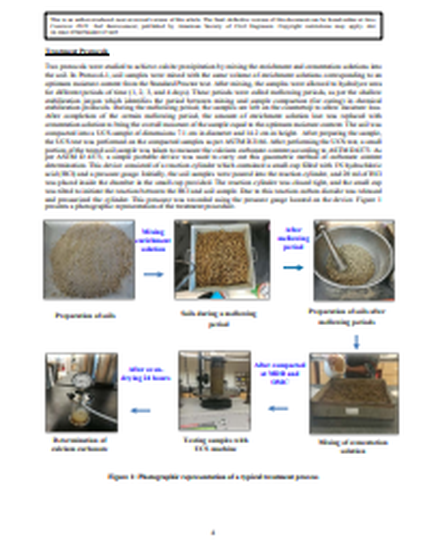
Expansive soils, also known as swell-shrink soils, undergo substantial volumetric changes due to moisture fluctuations from seasonal variations. These volumetric changes cause millions of dollars in damages annually. Microbial Induced Calcite Precipitation (MICP) is a promising soil improvement technique, which uses urease producing bacteria to precipitate calcium carbonate. In this study, a stabilization alternative for expansive soils was studied using MICP. Specifically, indigenous bacteria were stimulated by mixing enrichment and cementation solutions with expansive natural soils to precipitate calcium carbonate and make soil stronger and less expansive. This study examined three expansive soils with varying plasticity and mineralogical characteristics. Two protocols for shallow mixing were studied. In Protocol-1, soil samples were mixed with enrichment solutions at optimum moisture content and allowed to mellow for 1, 2, 3, and 4 days. In Protocol-2, soil samples were mixed with enrichment solutions at moisture content corresponding to 95% of maximum dry unit weight on the wet-side of a standard Proctor curve. Moisture was allowed to escape from the mix during the mellowing period under both protocols. Following the mellowing periods, the lost moisture is replaced with cementation solution to reach optimum moisture content, and the soil sample was compacted to its maximum dry unit weight. Unconfined compression strength test was used to evaluate the strength improvements due to treatments. The treatment effectiveness was also evaluated with measurements of calcium carbonate precipitation. The results show promise for this method as an alternative to current shallow stabilization methods. An increase in mellowing period for low and medium plastic soils was determined to be beneficial. The current results also showed that the presence of higher amounts of enrichment solution and addition of less cementation solution is not advantageous for this procedure based on the performance of Protocol-2.
This material may be downloaded for personal use only. Any other use requires prior permission of the American Society of Civil Engineers. This material may be found at doi: 10.1061/9780784482117.025
Available at: http://works.bepress.com/bhaskar_chittoori/64/
